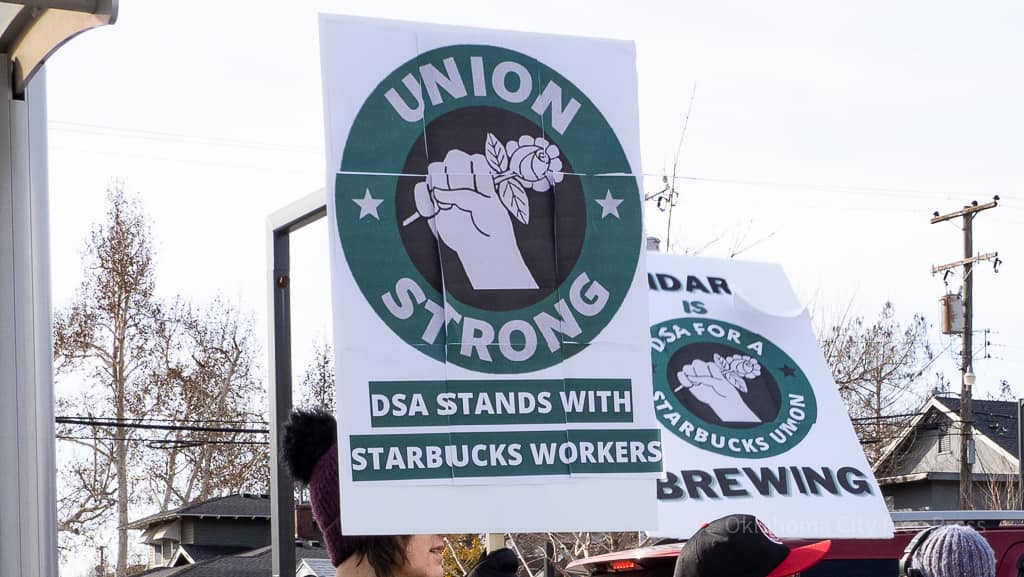Last Updated on August 6, 2023, 2:51 AM | Published: December 20, 2022
If the current unionized strikes at Starbucks stores like Oklahoma City’s Uptown 23rd location surprise you, please consider the recent behavior of some of the world’s richest men and corporations.
Last month, as he commenced his historic tanking of Twitter, Musk cut the social media company’s workforce in half, then proceeded to run off most of the rest with his mercurial batshittery while refusing to pay rent on the company’s corporate offices. While demanding round-the-clock work from a remaining skeleton crew, Musk put thousands of people out of work at a company that once employed 7,500 people.
On Dec. 14, Fred Ryan, publisher of The Washington Post, refused to answer employee questions after announcing another round of layoffs at the Bezos-owned newspaper. Weeks earlier at Amazon, the Bezos-owned company that transformed the global retail economy for both better and worse, abruptly fired about 10,000 people and rescinded job offers.
In the face of such rapacious corporate greed, it makes sense that strikes are on the rise.
Republished in partnership with Oklahoma Voice under Creative Commons license CC BY-NC-ND 4.0. Oklahoma Voice is a part of States Newsroom which is a nonprofit news network supported by grants and a coalition of donors as a 501c(3) public charity. Oklahoma Voice maintains editorial independence. Contact Editor Janelle Stecklein for questions: [email protected]. Follow Oklahoma Voice on Facebook and Twitter.

In its fourth quarter this year, Starbucks, the largest coffee retailer in the world, beat analysts’ estimates on earnings and revenue, pulling in $8.4 billion in revenue and $.82 in per-share earnings. Despite continued profits and far outdistancing its nearest competitors, the company has not reached a collective bargaining agreement with its employees’ union, Workers United, while 457 unfair labor practice charges were filed with the National Labor Relations Board against Starbucks.
Eyes tend to wander or roll when the distant past is invoked, but our era shares too much in common with the Gilded Age. The turn of the 20th century was a time of enormous economic growth in which unfathomable generational wealth was accumulated by a handful of men while laborers earned pennies per hour. When the robber barons who profited so handsomely from the Industrial Revolution refused to provide living wages, safe working conditions and that 48 hours of rest we call a weekend, unions were a check on their power.
The rise of unions after the 1935 passage of the National Labor Relations Act coincides with one of the longest periods of sustained growth in the U.S. economy. Conversely, the war against unions that was escalated in the 1980s by corporations and their conservative collaborators in government coincides with the offshoring of major manufacturing, monopolistic consolidation of corporations and multi-decade wage stagnation.
And that is where today’s workers stand. The national minimum wage has not risen since July 24, 2009, and yet apartment rental costs in Oklahoma rose by 30 percent this year alone. Corporate greed is responsible for this, along with the inflation that raised the price of almost everything else in our lives.
Under these conditions, it only makes sense that employees would get serious about organizing. Following a pandemic that killed 1.1 million Americans, people are naturally taking stock of their lives, and part of that reassessment means looking at how they are treated at work. This is where unions can help.
According to a database maintained at the Cornell University School of Industrial and Labor Relations, 374 strikes started in the U.S. in 2022, which is a rise of about 39 percent over last year. As layoffs persist in a time of record corporate profits, people are discovering there is strength in numbers.
With the strength that comes from collective bargaining, employees are not solely responsible for negotiating better wages, benefits or working conditions. So, when you see workers picketing in the cold during the holidays, don’t think about how difficult it is to get today’s first cup of coffee. Think about fairness in a time of gross unfairness, and how it sometimes takes bold acts of defiance for work – and life – to get better.
George Lang has worked as an award-winning professional journalist in Oklahoma City for over 25 years and is the professional opinion columnist for Free Press. His work has been published in a number of local publications covering a wide range of subjects including politics, media, entertainment and others. George lives in Oklahoma City with his wife and son.











